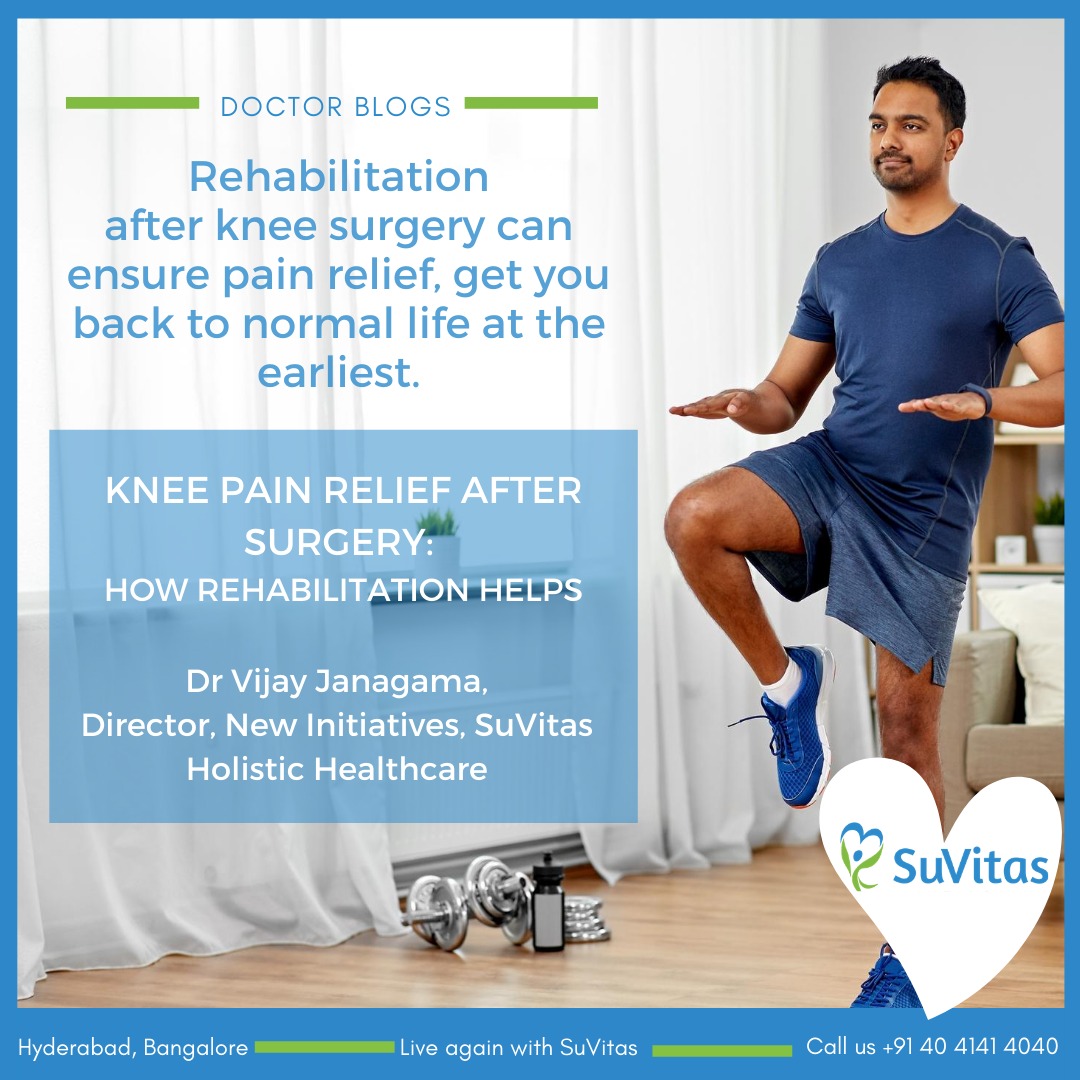Knee Pain Relief after Surgery: How Orthopedic Rehabilitation Helps
Dr Vijay Janagama,
Director, New Initiatives, SuVitas Holistic Healthcare
Knee replacement surgeries resurface a damaged knee. However, quite often a patient is not fully relieved of the pain even after the surgery. Arthroscopic surgeries, the minimally invasive alternative procedures, could also leave one in pain due to several reasons. Recognizing post operative symptoms early and initiating orthopedic rehabilitation care are essential in order to gain the full benefit of a knee replacement procedure.
Orthopedic rehabilitation is the specialized program designed for individuals suffering from musculoskeletal ailments to improve strength, endurance, flexibility and restore mobility & independence. Some common conditions which require orthopedic rehabilitation include hip or knee replacement surgeries, fractures, arthritis, sports injuries, degenerative joint diseases among others.
What causes Knee Pain after Surgery?
Post-operative pain is commonly reported among those who had a knee replacement procedure. However, some people may face more struggles during the recovery period due to certain co-morbidities. Few reasons why your knees may hurt after the surgery are
- Inadequate rehabilitation
- Infection
- Complications like spontaneous Osteonecrosis
- Joint Arthritis
- Inflammation and swelling
While applying ice and anti-inflammatory medications could help in reducing inflammations, nothing like a systematic rehabilitation programme can help in keeping a check on the co-morbidities thus providing complete pain relief and empowered recovery.
Pre- Rehabilitation for Knee Pain Relief
In order to have a minimally painful experience, doctors and therapists recommend undergoing a pre-rehabilitation programme before undergoing the surgery. Patients who followed an active lifestyle and performed pre-rehabilitation tactics including performing of exercises for up to 8 weeks until the surgery, recover faster. Therapeutic interventions and highly targeted exercises in the weeks leading up to surgery, strengthen the muscles around the joint, enhance blood circulation, reduce fatigue, swelling and risk of blood clots and improve the overall recovery. This is a way of preparing the knee joint for surgery.
Orthopedic Rehabilitation for Knee Pain Relief & Empowered Recovery
Orthopedic injuries, surgeries and illnesses could interfere with the function of the musculoskeletal system (comprising of muscles, bones, cartilage, joints etc) of the body thereby impairing movement and locomotion. For those who had very active lifestyles will find it extremely difficult to adjust with this condition and will require specialized care to easily get back to their normal lives. Orthopedic rehabilitation is thus recommended for early, effective and empowered care.
Key Components of Orthopedic Rehabilitation programmes are listed below:
- Base assessment– An analysis is done to understand the existing condition, chart the risk profiling and come to a predicting prognosis
- Goal setting-–Confirm realistic rehabilitation objectives by reaching mutually agreeable goals, family could also closely interact with the physician to drive the care plan
- Therapy– A multidisciplinary approach should be incorporated to the rehabilitation procedure by involving different specialities in therapy including physiotherapy, occupational therapy, skilled nursing, medical nutrition, emotional coaching etc.
- Knee Pain Relief– Design and implement a patient-centric care plan involving pain management techniques to ensure the patient is completely at ease throughout the rehabilitation procedure
- Assistive Devices– The recovering patient will need the support of assistive devices to aid in the accelerated restoration of movement, for safety and improvement of independence and performance. Orthosis and prosthesis are two such rehabilitation equipment used to support the limb or the spine to prevent or assist relative movement
- Activities of Daily Life (ADLs) management– Being able to perform the basic day to day activities independently, goes a long way in emotionally supporting the overall recovery of the patient. Therefore, sufficient emphasis should be given to training fundamental skills typically needed to manage activities like personal grooming, toileting, ambulating and eating
- Preventions (education and risk factor management)- The overall care plan needs to be constantly monitored for continuous evaluation of performance indicators and adjusting the programme as per the individual requirements and conditions
- Multidisciplinary coordination (amongst the rehab team)- Since a 360 degree holistic recovery can’t be achieved with individual doctors working in silos, a multidisciplinary team is desirable in driving the rehabilitation procedure for a complete recovery
- Empowerment (motivation & sustenance)- The impairment of functional abilities can significantly inflict trauma in an individual. Therefore the active involvement of the family members and an emotional counsellor will help in providing the required support for the patient to have an accelerated and empowered recovery
A detailed and consistent consultation with an expert panel of doctors is imperative in knee pain relief and also in the holistic recovery of an individual. Therefore, at SuVitas, we loop in the expertise and guidance of orthopaedic surgeons, physiotherapists, occupational therapists, skilled nurses, dieticians, prosthetists, orthotists and psychologists.
Also read 10 Reasons to Consider Knee Rehabilitation after Knee Replacement
Rehabilitation after knee surgery can ensure pain relief, get you back to normal life at the earliest.

